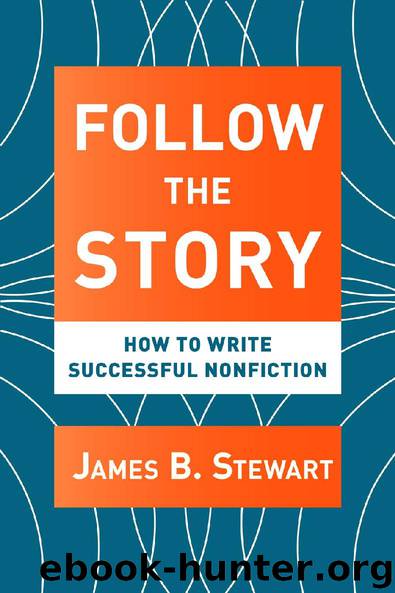Follow the Story by James B. Stewart

Author:James B. Stewart
Language: eng
Format: epub
Publisher: Simon & Schuster Paperbacks
9
DIALOGUE
IF DESCRIPTION enables readers to visualize a scene, dialogue lets them hear it. Like description, it makes events immediate and accessible; it allows readers to absorb material into their own lives and reflect upon it. It “shows” rather than “tells,” and is thus often far more persuasive and convincing than anything the writer can say. Consider the advent of “talking pictures,” and the importance of sound to what is usually considered a visual medium. Dialogue has been an important component of storytelling from time immemorial. Yet I find it is used far too infrequently in most nonfiction writing.
In writing, the spoken word is indicated by quotation marks, but it is important to distinguish between narrative quotations—statements made at the time of the events being described—and remarks made later, usually in response to a reporter’s questions. I call these contemporary quotations. Narrative quotations are statements that were made in the past. Their existence is a fact, like any other element of a story, such as the color of someone’s clothing or the size of a bank account. Quotations elicited by a reporter usually reflect statements made after the events in question, in which the speaker looks back and, with benefit of hindsight, offers comments, usually in response to a question. Though readers understand that a reporter’s research has taken place in the past, usually the recent past, such quotations are often framed in the present tense to distinguish them from narrative quotations.
To illustrate, consider these quotations from the lead paragraphs of the Sheinberg insider-trading story, in which Sid admonishes Jonathan not to trade on the confidential information he has just learned:
“Keep that to yourself,” he said. “For God’s sake, don’t trade on the stock.”
This is a narrative quote. It is a fact that on the day in September 1990 when Jonathan learned the confidential information about MCA, his father walked with him on the beach and said those words. The speech happened in the past, at the same time as the walk.
The story continues:
Months after this walk along the beach, Sid was asked whether he had believed his son would obey these admonitions. “I would have bet anything on it,” Sid replied.
This, too, is a narrative quote, as the story later makes clear. Even though the statement is not contemporaneous with the walk on the beach—it takes place “months after”—it occurs during another event in the narrative, Sid Sheinberg’s deposition, which occurred about two years before I reported and wrote the story. (The quotation is from his deposition transcript. I did not personally interview Sid.)
Toward the end of the story, Andrew Geist, the SEC lawyer in charge of the case, is quoted:
“My own personal opinion is that everyone is surprised when people in Hollywood do things that seem weird and strange, but they’re just like everybody else, if not more so.” He is confident that “the right result was reached,” he says.
This is a contemporary quote. Though as the reporter I am both invisible and silent, in an interview I had asked Geist to reflect on the meaning of the case.
Download
This site does not store any files on its server. We only index and link to content provided by other sites. Please contact the content providers to delete copyright contents if any and email us, we'll remove relevant links or contents immediately.
Cecilia; Or, Memoirs of an Heiress — Volume 1 by Fanny Burney(32538)
Cecilia; Or, Memoirs of an Heiress — Volume 2 by Fanny Burney(31934)
Cecilia; Or, Memoirs of an Heiress — Volume 3 by Fanny Burney(31925)
The Lost Art of Listening by Michael P. Nichols(7486)
Asking the Right Questions: A Guide to Critical Thinking by M. Neil Browne & Stuart M. Keeley(5751)
We Need to Talk by Celeste Headlee(5606)
On Writing A Memoir of the Craft by Stephen King(4925)
Dialogue by Robert McKee(4385)
Pre-Suasion: A Revolutionary Way to Influence and Persuade by Robert Cialdini(4214)
I Have Something to Say: Mastering the Art of Public Speaking in an Age of Disconnection by John Bowe(3871)
Elements of Style 2017 by Richard De A'Morelli(3336)
The Book of Human Emotions by Tiffany Watt Smith(3289)
Fluent Forever: How to Learn Any Language Fast and Never Forget It by Gabriel Wyner(3076)
Name Book, The: Over 10,000 Names--Their Meanings, Origins, and Spiritual Significance by Astoria Dorothy(2969)
Why I Write by George Orwell(2944)
Good Humor, Bad Taste: A Sociology of the Joke by Kuipers Giselinde(2939)
The Art Of Deception by Kevin Mitnick(2788)
The Grammaring Guide to English Grammar with Exercises by Péter Simon(2733)
Ancient Worlds by Michael Scott(2677)
